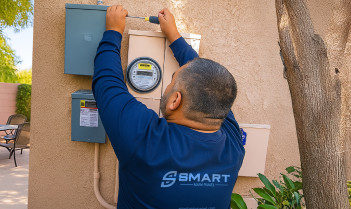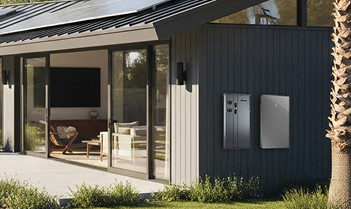
Date
Industrial Control Panel powered by Smart Main Panel
Industrial Control Panel powered by Smart Main Panel
Industrial control panels (ICPs) are crucial components in modern factories and industrial facilities. As automation and smart technologies advance, ICPs are evolving to become more intelligent and connected as part of the Internet of Things (IoT). This brings new capabilities, but also cybersecurity risks that must be addressed.
What is an Industrial Control Panel?
An industrial control panel is an assembly of power, control, and instrumentation components mounted inside an enclosure. It serves to control, distribute electricity, and protect electrical equipment in an industrial facility. Common components inside ICPs include:- Motor controllers like motor starters, VFDs, and PLCs- Overload and short circuit protection devices like fuses and circuit breakers- Power distribution blocks, terminal blocks, and wireways- Control devices like push buttons, lights, HMIs, and relays. ICPs provide a centralized way to control, monitor, and distribute power in industrial settings while protecting against electrical faults. They are made to survive under challenging conditions.
Benefits of Industrial Control Panels
Industrial control panels offer numerous benefits for industrial automation. They enhance efficiency and precision in industrial processes, reducing the need for manual labor. By automating tasks and providing real-time monitoring, control panels improve safety and reliability in industrial equipment. They also enable remote monitoring and control, allowing operators to track and troubleshoot issues easily. Customized control panel designs can be tailored to specific industry requirements. The use of industrial control panel enclosures ensures the safety and protection of electrical components. Electrical control boards within the panels facilitate organized and reliable distribution of power and signals.
Some of the key benefits of industrial control panels include:
- Enhanced Efficiency: Industrial control panels automate processes, reducing the time and effort required for manual tasks. This improves overall efficiency in industrial production.
- Precision Control: Control panels provide precise control over industrial processes, ensuring consistent and accurate results.
- Improved Safety: By automating tasks and implementing safety measures, control panels enhance the safety of industrial equipment and reduce the risk of accidents.
- Remote Monitoring and Control: Control panels enable remote monitoring and control of industrial processes, allowing operators to track performance and make adjustments from a central location.
- Customization: Industrial control panels can be customized to meet specific industry requirements, providing tailored solutions for different applications.
Overall, industrial control panels play a crucial role in optimizing industrial processes, improving efficiency, and ensuring the safe and reliable operation of equipment.
Growth of Smart and Connected Control Panels
With the rise of automation and IoT, ICPs are evolving by incorporating smart components and connecting to plant networks and the cloud:
Intelligent Motor Control
Smart motor controllers like variable frequency drives (VFDs), soft starters, and advanced motor protection relays monitor power quality metrics, offer diagnostics data, and enable advanced control algorithms like vector control. This optimizes motor and process efficiency.
Integrated Control and Safety
Safety PLCs and safety relays integrate standard and safety control into one platform. This reduces space requirements and wiring while enabling advanced safety functions.
Industrial IoT Connectivity
Connecting industrial control systems to local networks and the Internet via gateways or embedded IoT technology enables remote monitoring, asset management, and predictive maintenance powered by AI and advanced analytics in the cloud.
Cybersecurity Challenges for Connected Panels
While intelligence and connectivity provide major benefits, they also introduce cyber risks that must be managed proactively:
Increased Attack Surfaces
Networked devices and remote access capabilities give more potential entry points for attackers. Defense-in-depth strategies combining firewalls, VPNs, authentication, encryption and security hardening best practices are essential.
Vulnerable Legacy Equipment
Much equipment in use lacks modern security features. Segmenting networks, disabling unnecessary services, establishing DMZs, and monitoring traffic can help minimize risks.
Lack of Visibility
Important insight into the health of OT security defenses can be obtained through asset inventory, vulnerability management, network monitoring, and the implementation of a cybersecurity framework.
Smart Main Panel for Smarter Industrial Power Control
To balance connectivity and efficiency with security for modern industry, Smart Main Panel has developed an innovative Smart Main Control Panel solution. To balance connectivity and efficiency with security for modern industry, Smart Main Panel has developed an innovative Smart Main Control Panel solution.
The Smart Main Control Panel solution developed by Smart Main Panel aims to provide a balance between connectivity, efficiency, and security for modern industry. This innovative solution offers several key features and benefits.
Connectivity: The Smart Main Control Panel solution facilitates seamless connectivity between various devices and systems within an industrial environment. It enables real-time data exchange and communication, allowing for improved coordination and efficiency in operations.=
Efficiency: By integrating different control functions into a single panel, the solution streamlines the management and monitoring of industrial processes. It offers intuitive controls and user-friendly interfaces, enabling operators to easily access and control different systems from a centralized location. This enhances overall operational efficiency and productivity.
Security: Recognizing the importance of safeguarding industrial operations, the Smart Main Control Panel solution incorporates robust security measures. It utilizes advanced encryption protocols and authentication mechanisms to protect data and prevent unauthorized access. Additionally, it provides comprehensive monitoring and alert systems to detect and respond to any potential security threats.
Overall, the Smart Main Control Panel solution by Smart Main Panel offers a comprehensive and innovative approach to balancing connectivity, efficiency, and security in modern industry. Its features and benefits make it an ideal choice for industrial organizations looking to optimize their operations while maintaining a high level of security.
Integrates Motor Control, Power Monitoring and Cybersecurity
The Smart Main Panel packages a motor control center, power management hardware/software, and OT cybersecurity tools into a pre-configured solution simplifying design and deployment.
Enhanced Efficiency and Reliability
Integrated power management and control enables optimizing energy across equipment while maintaining process reliability. VFDs offer better motor efficiency.
Reduced Risk of Downtime
Remote monitoring and predictive analytics on the hardware health mitigates downtime from failing components while integrated safety cuts downtime from safety events.
Next-Gen OT Cybersecurity Protection
The solution combines security capabilities like network segmentation, role-based access control, multi-factor authentication, firewalls, SIEM integration and encrypted remote connectivity enabling implementation of prescriptive cybersecurity frameworks.With We’s Smart Main Control Panel solution, industrial operators can transform legacy hardware into a smart, efficient and cyber-secure industrial control panel that is ready for the future. Contact We today to explore how smarter power control can drive your business forward.
Contact Information
Phone: (555) 555-5555 Email: info@smartmainpanel.com
Key Features of a Smart Industrial Control Panel:
Modern ICPs integrate sensors, processing and connectivity to optimize electrical control. Key features include:
Centralized Control and Monitoring
A smart ICP consolidates monitoring and control applications into a central platform improving oversight into equipment and processes facility-wide.
Optimized Equipment Health Tracking
Onboard equipment sensors and cloud-based analytics proactively identify signs of deterioration before failure improving uptime.
Enhanced Power Quality Management
Power monitoring and software analytics at the equipment level identifies quality issues impacting output enabling better energy management.
Effective Alarm Management
Advanced alarm reporting, visualization and analytics makes it easier to identify and respond to critical issues in real-time.
IoT Connectivity and Standard Interfaces
Open connectivity via IoT protocols (ex. MQTT) and support of industry communication standards simplifies aggregation of panel data with higher level systems.
Security Recommendations for Smart Control Panels
To secure smart systems, key cybersecurity precautions include:
Network Segmentation
Divide industrial networks into zones based on risk level and implement firewalls between zones to contain threats. Smart ICPs simplify establishing conduits and DMZs.
Managing Accounts and Access
Leverage role-based access control, multi-factor authentication, and tools like LDAP to minimize insider risk. Disable unused services and protocols.
Continuous Monitoring for Threat Detection
Use SIEM tools and analytics dashboards to correlate events from ICP subsystems and identify IOCs or abnormal behavior indicative of compromise.
Establish Secure Remote Access
Utilize VPN connections secured with encryption rather than exposing panels directly to the Internet whenever possible when remote connectivity is required.
Frequent Patching and Updates
While some legacy equipment cannot be patched, update any patchable software on smart systems frequently, especially for known critical vulnerabilities.
The Importance of Smart Power Monitoring Capabilities
Power management is essential for industrial efficiency. Key benefits of power monitoring in smart ICPs include:
Optimizing Equipment Usage
Collecting and analyzing power metrics at the individual device/process level identifies underutilized assets and opportunities to improve productivity through better load balancing.
Reducing Energy Costs
Understanding true power consumption patterns enables negotiating better rates, shifting high consumption processes to off-peak times and identifying obsess equipment that should be upgraded to more efficient models.
Minimizing Harmonic Distortion Issues
Monitoring power quality metrics like harmonic distortion and transients allows addressing issues like undersized neutrals or capacitor banks before process disruptions occur.
Supporting Energy Management Initiatives
Smart power monitoring provides the data for establishing energy efficiency benchmarks, calculating carbon footprint metrics, identifying savings opportunities, and demonstrating progress towards sustainability goals.
Enabling Predictive Maintenance
Current signature analysis and related techniques that detect electrical anomalies enable identifying issues like worn bearings/contacts, unbalanced loads and capacitor degradation, driving predictive maintenance. By providing deep visibility into electrical consumption and power quality data across equipment, smart ICPs create actionable intelligence to enhance industrial efficiency, resiliency and cost management.
FAQ
What is an industrial control panel?
An industrial control panel is a system that controls and automates various industrial processes using electrical devices.
What components are included in an industrial control panel?
The components within an industrial control panel include main circuit breakers, surge arresters, transformers, terminal blocks, PLCs, relays and contactors, network switches, and HMIs.
What are the different types of industrial control panels?
There are several types of industrial control panels, including PLCs, HMIs, SCADA systems, DCSs, PACs, IPCs, and MCCs.
What are the benefits of industrial control panels?
Industrial control panels enhance efficiency, precision, safety, and reliability in industrial processes, while also enabling remote monitoring and control.
How do I choose the right industrial control panel?
When choosing an industrial control panel, it’s important to consider the specific application, industry requirements, system size, and budget. Consulting with control panel specialists can help in making the right choice.



